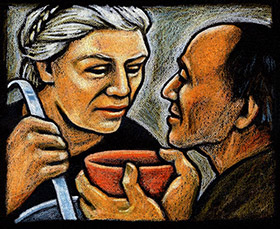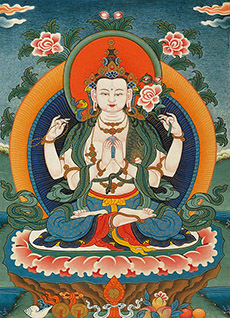by Rev. Crystal Muldrow
James 2:14-17 reads,
“What good is it, my brothers and sisters, if you say you have faith but do not have works? Can faith save you? If a brother or sister is naked and lacks daily food, and one of you says to them, ‘Go in peace; keep warm and eat your fill,’ and yet you do not supply their bodily needs, what is the good of that? So faith by itself, if it has no works, is dead,”
 One of my favorite Myrtle Fillmore quotes from the book Myrtle Fillmore’s Healing Letters is, “One’s arms and hands are to be thought of, and used, as God’s arms and hands, the expression of God-Mind’s ideas of power and loving service and splendid work.”
One of my favorite Myrtle Fillmore quotes from the book Myrtle Fillmore’s Healing Letters is, “One’s arms and hands are to be thought of, and used, as God’s arms and hands, the expression of God-Mind’s ideas of power and loving service and splendid work.”
Mahatma Gandhi echoes a similar sentiment, “The best way to find yourself is to lose yourself in the service of others.”
Our world seems to be made up of people who do great works to achieve self-happiness. Yet, as we spiritually mature, we learn that true happiness is achieved by doing greater things through the service of others.
 The popular story of the Bodhisattva Avalokitesvara (Guanyin) is a lesson in compassion and knowing that if one suffers we all suffer. The myth tells that the lovely, androgynous saint, Avalokitesvara, was on the verge of entering into nirvana, leaving behind forever the world of samsara (the world of delusion and suffering). Just as the meditation was deepening and insight into the transience of all phenomena was growing, Avalokitesvara was distracted by a great groaning, rising up all about in the world. Now out of the trance and, looking around, Avalokitesvara asked: What is this groaning I hear? All the birds and trees and grass and all sentient beings replied: O Avalokitesvara, … Your presence here among us has given us joy and a reason for living. We all love you so, and we are saddened by the prospect of your leaving us. And so we groan. Filled with compassion Avalokitesvara vowed to renounce nirvana until all sentient beings were equally enlightened.
The popular story of the Bodhisattva Avalokitesvara (Guanyin) is a lesson in compassion and knowing that if one suffers we all suffer. The myth tells that the lovely, androgynous saint, Avalokitesvara, was on the verge of entering into nirvana, leaving behind forever the world of samsara (the world of delusion and suffering). Just as the meditation was deepening and insight into the transience of all phenomena was growing, Avalokitesvara was distracted by a great groaning, rising up all about in the world. Now out of the trance and, looking around, Avalokitesvara asked: What is this groaning I hear? All the birds and trees and grass and all sentient beings replied: O Avalokitesvara, … Your presence here among us has given us joy and a reason for living. We all love you so, and we are saddened by the prospect of your leaving us. And so we groan. Filled with compassion Avalokitesvara vowed to renounce nirvana until all sentient beings were equally enlightened.
Jesus also knew that his very reason for being was to share himself and his wisdom with those around him. Doing so was as natural for him as breathing because he understood that all fulfillment comes from giving oneself.
“Joy can only be real if people look upon their life as a service and have a definite object in life outside themselves and their personal happiness.” –Leo Tolstoy
Just as Avalokitesvara and Jesus became enlightened, and as we too mature spiritually, our reasons for giving become more fully developed. We find ourselves serving, as they did, not to get something in return but because we recognize that giving is the essence of who we are, so we experience the joy that comes with it.
One of the purposes for our existence is simply to be happy. And we will never know true joy until we freely give of ourselves for the benefit of helping others. Our serve is more beneficial when we are involved with something that uses our gifts…our joys. Anytime we give from our passion, we give wholeheartedly.
 Service is also a great lesson as it challenges us to look at our attitudes toward receiving. Instead of teaching us to sacrifice, service teaches us how to accept gifts. This sounds like a contradiction. Yet, when we give for the pleasure of giving, we see how others get the same pleasure from sharing. We let them give to us because we know that it brings them joy, since that is our experience too.
Service is also a great lesson as it challenges us to look at our attitudes toward receiving. Instead of teaching us to sacrifice, service teaches us how to accept gifts. This sounds like a contradiction. Yet, when we give for the pleasure of giving, we see how others get the same pleasure from sharing. We let them give to us because we know that it brings them joy, since that is our experience too.
We serve others by honoring the Truth of them and for who they are because we open the door to possibilities they may never have thought of. Ultimately, we serve others by expecting the best for them. As we serve simply and purely, we add a little bit each day to Avalokitesvara’s and Jesus’ vision of a more compassionate world by doing greater things for one another.
“I slept and dreamt that life was joy.
I awoke and saw that life was service.
I acted and behold, service was joy.”
–Rabindranath Tagore


